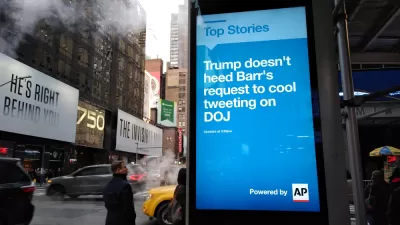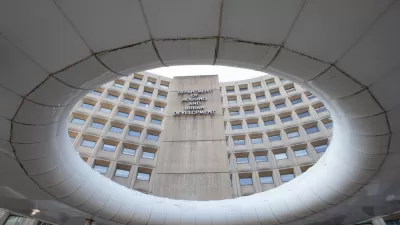The Supreme Court upheld the disparate impact doctrine at the heart of fair housing rules, along with many other anti-discrimination policies, in 2015. Still, the Trump administration is looking for ways to undermine disparate impact.

The U.S. Supreme Court upheld the disparate impact doctrine at the heart of fair housing rules, along with many other anti-discrimination policies, in 2015. Still, the Trump administration is looking for ways to undermine disparate impact in practice.
"The Trump administration is considering a far-reaching rollback of civil rights law that would dilute federal rules against discrimination in education, housing and other aspects of American life," report Laura Meckler and Devlin Barrett.
The sources for this scoop are anonymous "people familiar with the discussions," according to the reporters. While these might be good sources, that does not mean this new will actually come to pass.
But there is also a paper trail, according to the sources:
A recent internal Justice Department memo directed senior civil rights officials to examine how decades-old “disparate impact” regulations might be changed or removed in their areas of expertise, and what the impact might be, according to people familiar with the matter. Similar action is being considered at the Education Department and is underway at the Department of Housing and Urban Development.
The examples of disparate impact's importance to civil rights is rife with examples from the built environment—from housing in New York to transportation planning in Maryland.
"The Trump administration signaled its hostility to this approach in a report issued last month by the Federal Commission on School Safety," according to the article. Planetizen readers will also recall that the Trump administration has already taken steps to weaken the Affirmatively Further Fair Housing Rule, enacted by the Obama administration after the Supreme Court's disparate impact decision.
FULL STORY: Trump administration considers rollback of anti-discrimination rules

Planetizen Federal Action Tracker
A weekly monitor of how Trump’s orders and actions are impacting planners and planning in America.

Congressman Proposes Bill to Rename DC Metro “Trump Train”
The Make Autorail Great Again Act would withhold federal funding to the system until the Washington Metropolitan Area Transit Authority (WMATA), rebrands as the Washington Metropolitan Authority for Greater Access (WMAGA).

DARTSpace Platform Streamlines Dallas TOD Application Process
The Dallas transit agency hopes a shorter permitting timeline will boost transit-oriented development around rail stations.

Renters Now Outnumber Homeowners in Over 200 US Suburbs
High housing costs in city centers and the new-found flexibility offered by remote work are pushing more renters to suburban areas.

The Tiny, Adorable $7,000 Car Turning Japan Onto EVs
The single seat Mibot charges from a regular plug as quickly as an iPad, and is about half the price of an average EV.

Supreme Court Ruling in Pipeline Case Guts Federal Environmental Law
The decision limits the scope of a federal law that mandates extensive environmental impact reviews of energy, infrastructure, and transportation projects.
Urban Design for Planners 1: Software Tools
This six-course series explores essential urban design concepts using open source software and equips planners with the tools they need to participate fully in the urban design process.
Planning for Universal Design
Learn the tools for implementing Universal Design in planning regulations.
Municipality of Princeton
Roanoke Valley-Alleghany Regional Commission
City of Mt Shasta
City of Camden Redevelopment Agency
City of Astoria
Transportation Research & Education Center (TREC) at Portland State University
US High Speed Rail Association
City of Camden Redevelopment Agency
Municipality of Princeton (NJ)





























